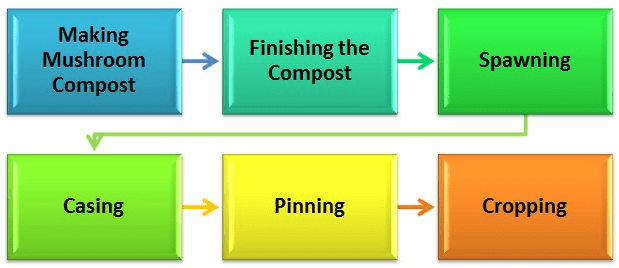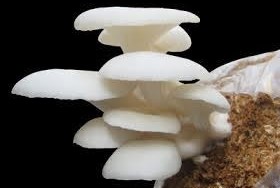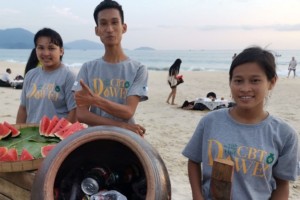Why are travel & tourism workers growing mushrooms in rural Sri Lanka?

Susan Eardly and Dinesh Pathirana are empowering rural Sri Lankan families previously reliant on tourism income to develop sustainable businesses. In this “Good Tourism” Insight, Ms Eardly discusses funguses and answers the question: “Why fungi?”
(Thanks to “GT” Friend Richard Shepard for the introduction.)
Sri Lanka, the tropical island set like a pearl in the Indian Ocean just off the coast of India, with its scenic tea plantations and absorbing cultural heritage sites … Sri Lanka, the nature-lover’s paradise of beautiful sandy beaches, wildlife, and waterfalls … Even Sri Lanka could not escape the COVID-19 pandemic.
The coronavirus has disrupted the whole economic, social, and environmental ecosystem of the island, and has deeply impacted livelihoods in rural areas, particularly those directly or indirectly reliant on the travel & tourism industry.
At Serene Vacations, we decided to work together as a team to support the most affected in the rural tourism sector. We wanted to find ways to mitigate the worst economic effects of COVID and create new opportunities that could carry on long after the crisis. We aimed to create new rural entrepreneurs through projects that would generate sustainable income and create new jobs for rural families; those who had been working in the tourism sector but who have since lost their jobs and income following the 2019 Easter attacks and now the COVID-19 pandemic.
Why fungi?
Beyond improving the immediate economic conditions for those most affected, we also aimed to improve the overall nutritional status of the community to help it thrive in the long-term, while minimising any impact on the natural environment. That’s why we hit upon mushrooms!
As we know, mushrooms are a vegetable and their production can be a profitable eco-friendly agribusiness. Mushrooms have received increased attention in recent years because of their medicinal benefits. As per the BBC and others (The Mushroom Council; Medical News Today), mushrooms contain a significant amount of dietary fiber, protein, amino acids, vitamins (including B1, B2, B12, C, D, and E), and minerals. Mushrooms are low in fat and calories and are a good immune booster with cancer-fighting properties.
As a livelihood diversification option, mushroom cultivation has enormous potential to improve food security and income generation, which in turn can help boost rural and urban sustainable economic growth.
Mushroom cultivation in Sri Lanka is scattered around the country. It is mostly done at the household level as a small business. Despite demand for good quality mushrooms in Sri Lanka, cultivators have failed to meet that demand and/or the required quality standards due to lack of finances, knowledge, and support.
Our project aims to improve local supplies of mushrooms for village households, restaurants, hotels, and supermarkets. To that end we aim to create small farmer entrepreneurs in each district of the country capable of satisfying local demand. To help them along, we intend to address the social, environmental, and economic challenges faced by rural families by working closely with them and other stakeholders.

Once established, the entire mushroom production cycle takes approximately 15 weeks, from the start of composting to the final “steaming off” after harvesting. A mushroom grower can expect up to 4 lbs (a little under 2 kgs) of product per square foot. The final yield depends on how well a grower has monitored and controlled temperature, humidity, pests, and so on.
Objectives
- Create new jobs and generate income for those whose livelihoods were too dependent on tourism
- Supply chain development
- Introduce innovative technology to reduce production costs, increase yields, and improve quality
- In the long term, create export-oriented products through bottling and drying
- Empower women by giving them leadership roles in rural communities
- Alleviate waste accumulation through mushroom composting methods
The income generated will benefit families, communities, and the country’s economy. We intend to implement smart farming solutions and improve value chains so that farmers will reap long-term commercial benefits.
Expected benefits
- For producers: With the introduction of new technology, financial support, and advanced training, farmers will produce a high quality product at lower cost, making the product attractive to hotels, shops, and other buyers. We will also help them expand their markets as they increase production.
- For consumers: Consumers will have the opportunity to buy high quality and nutritious mushrooms for lower prices.
- For the economy: Livelihood enhancement; sustainable economic growth; and opportunities to reach global markets through exports.
Through inclusive business practices we plan to create opportunities for skills development, increase the number of women-owned and operated businesses, implement flexible work practices, and respond to environmental impacts.
Who has benefitted so far?
Christo from Sigiriya

Sigiriya is part of the cultural triangle in Sri Lanka. Christo is a tourist driver who lost his job after the 2019 Easter attacks. The 44-year-old needs to support his family, including his wife, child, and mother. But his ability to do that still depends upon a volatile and unreliable tourism-derived income. So Christo started cultivating mushrooms in September 2020 and has just started harvesting.
Janaka and Lemani from Habarana
Habarana village adjoins a wildlife sanctuary near Sigiriya where 42-year old Janaka is a safari service provider. He has more than 15 years’ experience taking travellers to see wildlife. An avid nature lover, Janaka adored his jungle job. But then tourism vanished.
Janaka and his wife Lemani plan to grow mushrooms to supply nearby restaurants and hotels. Their income from this new venture will support their two young sons, allowing them to attend school on a regular basis. It will also give them an opportunity to support Janaka’s father who grows vegetables and rice.
With our support, Janaka started building two mushroom growing rooms in late October. According to local tradition, he selected the most auspicious time to start — exactly 7:28 in the morning — and followed his religious traditions, offering thanks to the nature gods.
Sudath from Kurunegala
Our third mushroom entrepreneur is 39-year old Sudath. Sudath was a manager in a beautiful villa located in Wilpattu, a wildlife sanctuary in northern Sri Lanka … until he lost his job in August. He has two little daughters who attend school. Sudath has taken government training courses on mushroom cultivation, selected a location to start, and is now looking for the funds to begin construction of cultivation rooms. Sudath plans to first sell his mushrooms to households in his village, and later to nearby restaurants.
Asanka from Matale
Matale in central Sri Lanka, near Kandy, is famed for its spices. Formerly a tourism driver in the area, Asanga has a two-year old daughter. His wife works for the government postal service.
Having completed his training in growing mushrooms, the 34-year-old decided he would be better suited to selling and distributing them. Asanga has planned a collection center for locally-grown mushrooms and hopes to supply hotels. He now needs funds to build the collection center and acquire a delivery vehicle.

Awaiting training in Tissamaharama
We have very recently identified three other budding entrepreneurs keen to enter the mushroom business. They are all from Tissamaharama in southern Sri Lanka (near Yala National Park), they all have dependents, and they all await training that will help them survive the COVID-induced tourism crisis now and help them with another source of income in future: Susantha, 48, a wildlife guide; Chandrasiri, 62, who is also a wildlife guide; and Chandare, 39, a fishing guide.
What support is needed to continue?
Like everything else, we plan to continue our work as we raise funds. Each mushroom project needs about USD2,000 to complete construction and start up. The new farmers also need technical and training support in mushroom cultivation and processes. The technical guidance and support, which we organise, will be of enormous benefit to the majority of mushroom growers, particularly at the initial stages of cultivation. For many, this is a new venture, but even for those who have the basic knowledge, many technical terms and procedures for sustainable mushroom cultivation are unfamiliar.
So, we are financing the project through individual contributions and donor organisations, and we rely on volunteers, but of course we will need additional help to make this project a success. By spreading the word on how we are combating the effects of the pandemic, and creating new opportunities to replace those that have been lost in the travel sector, we hope to provide some inspiration and, of course, attract additional financial help. We aim to uplift rural families and have no expectation of commercial returns for Serene Vacations.
What do you think? Share a short anecdote or comment below. Or write a deeper “GT” Insight. The “Good Tourism” Blog welcomes diversity of opinion and perspective about travel & tourism because travel & tourism is everyone’s business.
Featured image (top of post): Oyster mushroom abstraction. Image (CC0) via Pikrepo.
About the author

Susan Eardly (email) is a tourism entrepreneur in Sri Lanka, having founded Serene Vacations, a travel agency, with her husband Dinesh Pathirana. With a Master’s in Business Management, Susan has been a passionate player in the tourism industry since 2004, and has developed an extensive international network of business contacts through her travels.
She believes travel & tourism is “more about interest and creativity, and helping travellers get their best experience; not only about investment and revenue”. She adds: “I believe that success depends on the ability to think strategically and to believe in possibilities. SUCCESS is all about taking action for your dreams.”
Thanks to “GT” Friend Richard Shepard for the introduction.





